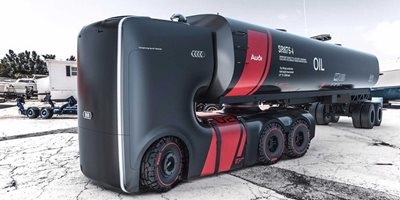Published: 14 June 2018

With the advancements in technology, transport is changing faster every day. Following the last few decades of innovation, the last few years has paved the way for the future with the creative approach towards electrical or self-driving vehicles, one of the biggest examples of this was Tesla’s new, fully electrical HGV model unveiled which can jump from 0MPH to 50MPH in an absurdly short time.
Strategic advisor and founder of City Innovate, Timothy Papandreu stated this will clearly have a massive change on how people travel and how goods are moved and the changes could be far sooner than we anticipate. Speaking regarding the matter, he said:
"The last 75 years of transportation, not much has changed, but the last five years, we've seen a lot," he told an audience during a talk at the Movin' On by Michelin Global Summit in Montreal last week. "We are a city planet and the reason is that close to half of the world's population lives near a city and in the next 30 years, that will be close to three-quarters."
City Innovate is designed to support urban areas overcome poverty struggles and take advantage of the new technology which will ultimately improve transport on a nationwide scale. The founder used to work at Google, on the Waymo project before creating Innovate.
Papandreau also focused on how this will have a ripple effect on freight, too, continuing to state that the way goods are move will change as services such as public transport start to change.
In America, the ATRI (American Transportation Research Institute) gave their own thoughts on the subject, stating that trucking in the US as well as road development costs the country $63.4 billion (£47.5 bn) a year. Those costs are thanks to the 996 million hours of lost industry productivity, with around 362,000 truckers sitting still for that time over a full year.
With more of the population moving closer to cities this is expected to worsen over the years. This is a problem reflected on an international scale, as seen by the UK’s own data. Research shows that a fifth of time at the wheel is spent at traffic lights, that doesn’t include traffic jams, delays, back-ups or temporary roadworks.
While many rely on their vehicles, have they become more of a means to an end than something drivers enjoy? Does this signify the end for manual vehicles, bringing forward the future of autonomous vehicles because it would make travel faster?
The founder of City Innovate has his own solution: bikes, walking, sharing rides and services and bracing for the future with autonomous vehicles once they hit the roads and become available for public use. In 2017, a survey recorded that 74% of drivers in the UK stated they wouldn’t feel safe in a self-driving vehicle. However, this survey was retaken in 2018, that figure has now lowered to 47% who said they wouldn’t feel safe. There’s a sign that many are willing to embrace the future of technology, as time continues and we see more test drives become successful will more and more drivers become comfortable with the idea?
What does this mean for the haulage industry? Self-driving trucks are still a long way from daily use, but the foundations have already been set. As for how long it would take for the change to take place and for the industry to embrace the future only time will tell.